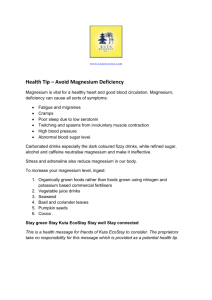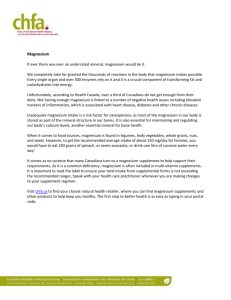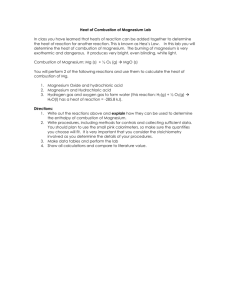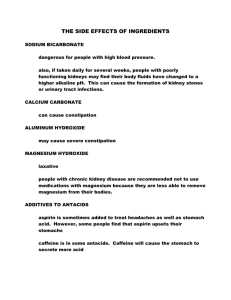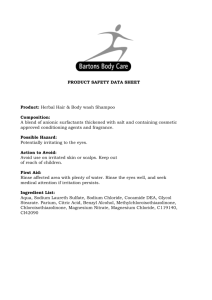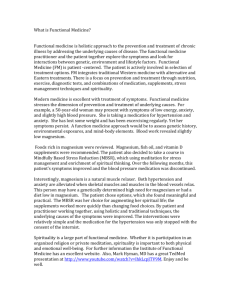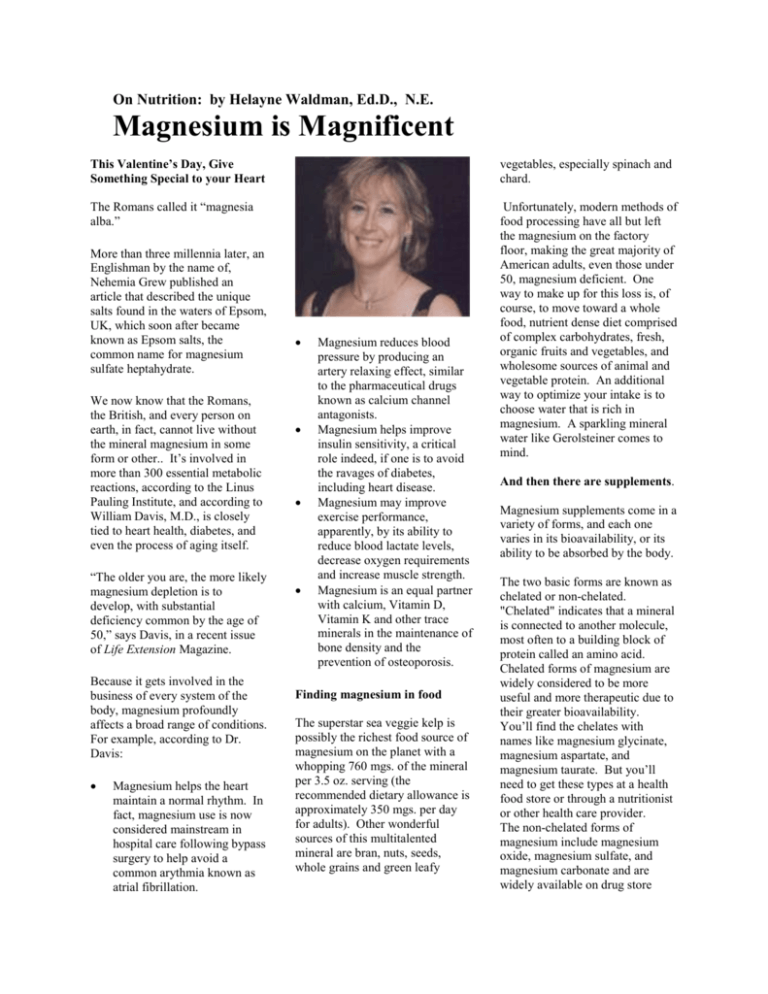
On Nutrition: by Helayne Waldman, Ed.D., N.E.
Magnesium is Magnificent
This Valentine’s Day, Give
Something Special to your Heart
vegetables, especially spinach and
chard.
The Romans called it “magnesia
alba.”
Unfortunately, modern methods of
food processing have all but left
the magnesium on the factory
floor, making the great majority of
American adults, even those under
50, magnesium deficient. One
way to make up for this loss is, of
course, to move toward a whole
food, nutrient dense diet comprised
of complex carbohydrates, fresh,
organic fruits and vegetables, and
wholesome sources of animal and
vegetable protein. An additional
way to optimize your intake is to
choose water that is rich in
magnesium. A sparkling mineral
water like Gerolsteiner comes to
mind.
More than three millennia later, an
Englishman by the name of,
Nehemia Grew published an
article that described the unique
salts found in the waters of Epsom,
UK, which soon after became
known as Epsom salts, the
common name for magnesium
sulfate heptahydrate.
We now know that the Romans,
the British, and every person on
earth, in fact, cannot live without
the mineral magnesium in some
form or other.. It’s involved in
more than 300 essential metabolic
reactions, according to the Linus
Pauling Institute, and according to
William Davis, M.D., is closely
tied to heart health, diabetes, and
even the process of aging itself.
“The older you are, the more likely
magnesium depletion is to
develop, with substantial
deficiency common by the age of
50,” says Davis, in a recent issue
of Life Extension Magazine.
Because it gets involved in the
business of every system of the
body, magnesium profoundly
affects a broad range of conditions.
For example, according to Dr.
Davis:
Magnesium helps the heart
maintain a normal rhythm. In
fact, magnesium use is now
considered mainstream in
hospital care following bypass
surgery to help avoid a
common arythmia known as
atrial fibrillation.
Magnesium reduces blood
pressure by producing an
artery relaxing effect, similar
to the pharmaceutical drugs
known as calcium channel
antagonists.
Magnesium helps improve
insulin sensitivity, a critical
role indeed, if one is to avoid
the ravages of diabetes,
including heart disease.
Magnesium may improve
exercise performance,
apparently, by its ability to
reduce blood lactate levels,
decrease oxygen requirements
and increase muscle strength.
Magnesium is an equal partner
with calcium, Vitamin D,
Vitamin K and other trace
minerals in the maintenance of
bone density and the
prevention of osteoporosis.
Finding magnesium in food
The superstar sea veggie kelp is
possibly the richest food source of
magnesium on the planet with a
whopping 760 mgs. of the mineral
per 3.5 oz. serving (the
recommended dietary allowance is
approximately 350 mgs. per day
for adults). Other wonderful
sources of this multitalented
mineral are bran, nuts, seeds,
whole grains and green leafy
And then there are supplements.
Magnesium supplements come in a
variety of forms, and each one
varies in its bioavailability, or its
ability to be absorbed by the body.
The two basic forms are known as
chelated or non-chelated.
"Chelated" indicates that a mineral
is connected to another molecule,
most often to a building block of
protein called an amino acid.
Chelated forms of magnesium are
widely considered to be more
useful and more therapeutic due to
their greater bioavailability.
You’ll find the chelates with
names like magnesium glycinate,
magnesium aspartate, and
magnesium taurate. But you’ll
need to get these types at a health
food store or through a nutritionist
or other health care provider.
The non-chelated forms of
magnesium include magnesium
oxide, magnesium sulfate, and
magnesium carbonate and are
widely available on drug store
shelves, as they are cheaper to
manufacture. While these forms –
particularly the oxide and sulfate -will help hasten a recalcitrant
bowel, there is concern among
professionals that it won’t stay in
the body long enough to do much
good.
As always, it’s best to consult with
a trusted professional who can help
you address your own unique
biochemical needs. In the
meantime, give yourself a heartfelt
gift this Valentine’s Day – a dinner
of delicious, healthful,
magnesium-rich goodies.
___________________________
Helayne Waldman, Ed.D , N.E.,. is
a health and nutrition educator, a
writer, and an Adjunct Professor
in the Dept. of Holistic Health
Studies at JFK University. She
can be reached at
hwaldman@turning-thetables.com, or on the web at
www.turning-the-tables.com
©2005-2006 Helayne Waldman, Ed.D., N.E.. All rights reserved.


